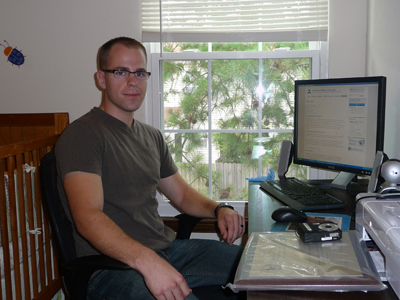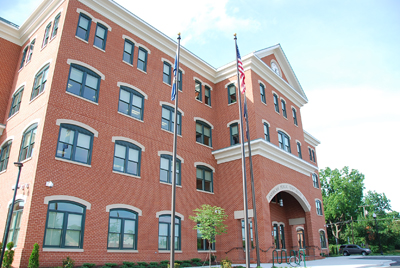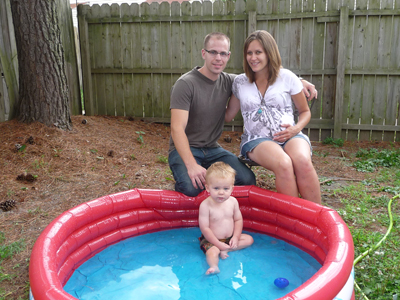Tim Caucutt earned a liberal arts degree from a university with an enrollment of about 60,000, but he never once laid eyes on a fellow student. And chances are you've never heard of his school, either.
Caucutt attended American Military University, a completely online institution. It's part of the for-profit American Public University System (APUS). Caucutt completed his B.A. in political science while serving as a combat instructor on a military base near San Diego, Calif.
"In the evenings and Saturdays I would spend a lot of time in the library," says Caucutt, 26. "I would just take my laptop down to the public library, set up and be a college student."
Caucutt found his college through a Google search. Back in his teens, Caucutt briefly attended a Baptist college in Wisconsin but quit to join the Marines. He signed up with APUS in 2008 and got his B.A. in three years.
More than 1.5 million American students are enrolled full time in degree programs at for-profit institutions, according to the College Board. But liberal arts majors are a relative rarity at for-profit schools. They're a rarity in online programs, too. Most people who pursue a liberal arts degree do so at traditional bricks-and-mortar schools.
That makes Tim Caucutt a scarce breed. At least for now.
For-profit colleges and universities have boomed over the past decade, but liberal arts programs make up "an incredibly small part" of what for-profit schools have to offer, says Kevin Kinser, an education professor at the State University of New York at Albany who studies the for-profit sector. He says most students at for-profits are in narrowly focused degree programs, such as business, computers, health care and criminal justice. "History, philosophy, English - these are rarely offered in the for-profit sector," he says.
As APUS demonstrates, liberal arts classes can be a money maker.
American Military University was founded in 1991 by a former Marine to offer a portable education to active-duty military personnel as they transferred from base to base. Over time it expanded its course offerings and in 2002 launched a second brand, American Public University, aimed mainly at public service professionals. More than 90 percent of the 90,000 APUS students are working adults. Most are active military personnel who can use their GI benefits to help pay tuition.
"We're established to provide them with an education that helps them either further their career profession, or they simply have an interest in a particular degree or program," says APUS President Wally Boston.
Some 12,600 of APUS's undergraduates are majoring in the liberal arts. That's about 14 percent of all students. But liberal arts subjects are among the most heavily populated courses because APUS - like traditional liberal arts schools - requires all undergraduates to take two years of fundamental classes in English, mathematics and social sciences. Boston says he recently had 65 sections of English 101 running at the same time.
For-profit schools are sometimes required to have liberal arts programs in order to be accredited, but APUS officials say that's not the only reason they make students take English. They say the liberal arts are core to the APUS mission.
"If you're a real university, which we are, you include the liberal arts," says Karen Powell, senior vice president for academic affairs. "Our focus is on the whole person and liberal arts is about developing the whole person."
Buildings without Students
APUS is based in Charles Town, W. Va., a small, historic community a few hours' drive from Washington, DC. Company offices are in a series of restored brick houses and a new four-story academic center. The parent company of APUS became publicly traded on the stock market in 2007 (stock symbol APEI).
APUS employs more than 300 full-time faculty and some 1,300 adjunct instructors, most based in the United States. Some liberal arts faculty members teach during the day at brick-and-mortar schools and moonlight online for APUS. Others are retired from traditional institutions. Still others have qualifications such as graduate degrees or real-world experience on their resumes that APUS says make them eligible to teach but that conventional colleges and universities would not likely recognize.
APUS offers 85 degrees and some 2,000 courses. A new semester begins each month so that students can make their coursework fit their life and job schedules. The average class size is 15 with a maximum of 25 students.
"You're not sitting in a large lecture hall with hundreds of people. You get a much closer, more intimate relationship with the professor," Boston says.
In a conference room at the Charles Town academic center, Ev Corum jacks a blue internet data cable into his laptop and gets ready to tour APUS's virtual campus. Corum holds a Ph.D. in theater and media arts from the University of Kansas and is the program director for humanities, philosophy and religious programs. With a web browser, Corum clicks into an eight-week course he designed on public speaking. It opens with a welcome speech from Corum. He encourages students to learn that public speaking can be "a pleasant and even joyful experience."
The virtual classroom includes the course syllabus and reading materials. There's also a discussion board where Corum and the students go over assignments, debate ideas and comment on each other's work. Students post five-minute speeches on YouTube. In one, a student faces the camera and extols the work culture at Walmart, where she has a job.
"What I would say to this student is, your energy is good but your tone is a little flat," Corum says. "So let's go for greater vocal variety - the high, high notes and the lower lows."
When he was first asked to create the public speaking course, Corum wasn't sure it could be done on the internet. Classes are not held in real time - students and instructors log in and check the discussion board when it's convenient. So there's no live public to speak to. Instead, Corum views the web - with its social networks and video streaming sites - as a "mediated" public square. In other words, 21st century public speaking is done on an electronic soapbox, not standing on a street corner.
The virtual classroom may be an especially effective place to teach some liberal arts disciplines, according to Peter Stokes. He holds a Ph.D. in literature and was once a college teacher. "Teaching composition online can be extremely productive," Stokes says, as can history, political science or other disciplines that rely heavily on writing. "It's a chance for writers to learn how to write in a writing context," he says.
As for teaching sculpture on-line, maybe not so much.
Cost and Quality
Some for-profit schools have been criticized for offering low-quality courses at high prices. Average tuition and fees at a four-year public college or university are $6,400 (not including student living expenses). That figure is $15,300 at for-profit institutions and $24,900 at private nonprofits, according to a 2011 report by the National Center for Education Statistics. APUS charges $6,000 per year in tuition, according to NCES. At public and nonprofit schools, prices for undergraduate tuition, room, and board have increased 25 - 37 percent over the past 10 years, according to the U.S. Department of Education. APUS kept its tuition flat for a decade. That's actually about a $1,200 price cut after adjusting for inflation.
"We are passionate about providing an affordable education," Boston says.
Regarding quality, APUS stresses its accreditation with the Higher Learning Commission, North Central Association, and the Accrediting Commission of the Distance Education and Training Council. These agencies are recognized by the U.S. Secretary of Education as reliable authorities on acceptable quality standards.
APUS also stresses its small class sizes. Karen Powell, academic dean for APUS, says in a traditional college lecture hall, some students inevitably lurk behind their books and laptops to avoid taking part. "In the online environment there will never [be] more than 25 students in our classes. The average size is 14," Powell says. "Your voice will always be there. Because you're required to enter your perspective and respond to the perspectives of the others in the class. If you sit in the back and hide you won't pass."
The market value of an online degree as opposed to a conventional school is open to debate. A survey of employers by Eduventures, a consulting firm that works with more than 300 American colleges and universities, found that a majority of employers viewed an online degree as equal to or better than classroom learning. But researchers at Cleveland State University found "there still may be a marked stigma attached to online degrees" among employers.
Only about 5 percent of liberal arts bachelor's degrees are earned online in the United States, compared to about 15 percent of degrees in business and management, according to Peter Stokes, the head of research at Eduventures. Stokes says for-profit colleges pose little threat to conventional public and private non-profit intuitions.
"The for-profits have really created a new market," Stokes says. Rather than poaching students from traditional schools, for-profits are "there to serve those students when the non-profit segments of the market turn them away," Stokes says.
Most for-profits have open admissions policies - anyone able to pay can attend.
More for-profit schools may follow APUS down the liberal arts path, according to education policy expert Kevin Carey of the Washington, D.C., think tank Education Sector. "While the bulk of the for-profit industry remains pretty vocational, pretty job-oriented, the growth in the future will be more in traditional liberal arts degrees," Carey says. He predicts that as the job market places an increasing premium on college degrees, more working adults will go back to school to earn a degree or complete the education they started earlier in life.
"There are plenty of non-traditional learners who can't quit their job for four years," Carey says. "Traditional institutions aren't set up to serve students like that very well. For-profits, on the other hand, are very much set up for people like that."
On to Bricks and Mortar
Since he completed his B.A. at APUS, Tim Caucutt and his family have moved to Chesapeake, Va., where he now works as a Marine Corps recruiter. Caucutt is married with two small children. He plans to pursue a master's degree in political science at a bricks-and-mortar college or university. He wants to work in public policy when he retires from the military. Caucutt seems realistic about his prospects. "I understand that a degree online is not going to be extremely attractive to a lot of universities, even though it's accredited," he says. "I figured I should move to a state that has a lot of programs to increase my chances."
Caucutt praises the program at APUS for pushing him to do a lot of writing and for the availability and encouragement of the faculty he worked with. While he might have preferred to go to a college with real classrooms and a library filled with books, APUS had what he needed: cost and convenience.







